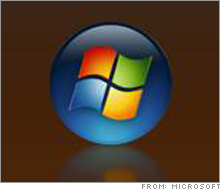To love or hate Vista?Doesn't matter. Microsoft still rules. Here's a better question: Why isn't Linux living up to its promise?(Business 2.0 Magazine) -- Looking for a cheap PC this holiday season? Good luck trying to find one with anything but Microsoft's Windows on it. That's odd. Linux is more popular than ever, Apple (Charts) is resurging, and Microsoft's efforts to put Windows Vista on store shelves have been hobbled by delays. You'd think consumers would have more choice as the holiday season kicks off.
Yet Windows might as well be the only game in town for popular PCs under $500. The cheapest Windows PC on the market is a Gateway eMachines that retails for $348 on Walmart.com. On Black Friday - the day after Thanksgiving - BestBuy will sell the eMachines with a monitor for $180. The least expensive Linux machine? A $348 Microtel, which has an even slower processor than the eMachines and doesn't come with extras. You're better off buying a faster Windows machine and installing a free copy of Linux on it. This isn't how the Linux open-source uprising is supposed to happen. We should be seeing a $278 computer with Linux installed - one that subtracts out the $70 that Microsoft pockets on average for every copy of Windows. What's going on? Add on Linux, lose on Windows There's a reason Linux is largely absent from retail stores today - and it has nothing to do, as some Slashdot conspiracy theorists would have it, with nefarious business tactics by Microsoft (Charts) (along the lines of what first landed the company in hot water with antitrust authorities a decade ago). This is about economics, pure and simple. Everybody knows that Microsoft, with more than 90 percent market share, has a strong hold on the operating system market. Less known, however, are the dynamics that let Windows stay so dominant. To settle the government's massive antitrust lawsuit, Microsoft agreed to charge all PC makers a uniform royalty, based on the number of Window licenses they buy. The more Windows licenses a PC maker buys, the cheaper the cost per unit. While Microsoft can't punish companies for selling rival operating systems, machines with anything but Windows installed don't help PC makers meet the quotas necessary to pay Microsoft lower rates. "Microsoft doesn't leave much room for negotiation," says Citigroup analyst Brent Thill. Nor does it have to. What if Linux went luxe? Hewlett-Packard (Charts) could, in theory, save some money upfront by putting Linux on 10 percent of the desktop PCs it sells at retail. But that would just make the rest of its Windows desktops more expensive, because it would no longer be selling as many Windows licenses as archrival Dell, and Microsoft could legally charge it more. HP, which recently overtook Dell (Charts) the world's largest PC maker, can't afford to hand its vanquished rival any cost advantages. In a nutshell, switching to a rival OS system will hurt more than help the bottom lines of PC makers. The straightforward economic scheme that regulators set up to keep Microsoft in check is essentially keeping the PC industry in the Windows fold - just as Redmond's brass-knuckle tactics once did. This explains why Walmart.com sells a Linux PC made by Microtel Computer Systems, an obscure PC maker few people have heard of. The companies that are brave enough to sell Linux PCs are the ones that aren't unloading large volumes of Windows PCs to begin with. And because they're small, they can't negotiate volume-based price discounts with component suppliers like Intel. That's why Microtel's Linux PC is less powerful than a Windows machine at the same price. It's ironic, really. PC makers have a love-hate relationship that often seems to tilt toward hostility. Last month an executive at Acer (Charts), the fourth-largest computer maker, criticized some aspects of Vista as no better than today's Windows XP - just pricier. And Michael Dell, the Dell founder, has mused about installing Apple's rival OS X operating system on the company's computers - an option that Apple CEO Steve Jobs has nixed. There's clearly an opportunity here for Linux suppliers. Seizing it, however, is going to require a whole new marketing mindset. They should forget touting Linux as a cheaper alternative to Windows. Instead, pitch Linux as a luxury product whose stability, versatility, and virus-resistant technology deserve a premium price. After all, the high-end strategy has worked beautifully for Apple, whose share of the computer market is growing. And if consumers prove willing to pay more for a Linux PC, then PC makers will be a lot more eager to pre-install the software. Luxe Linux has a certain ring to it. But until someone tries it, don't expect a crack in the Windows. |
|

